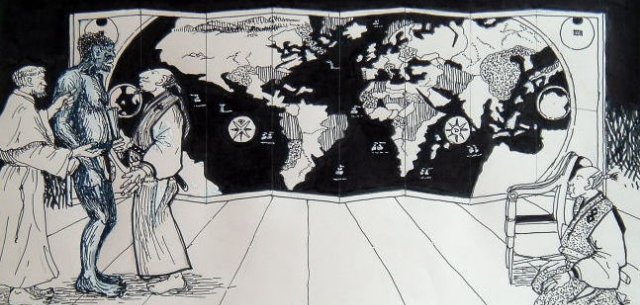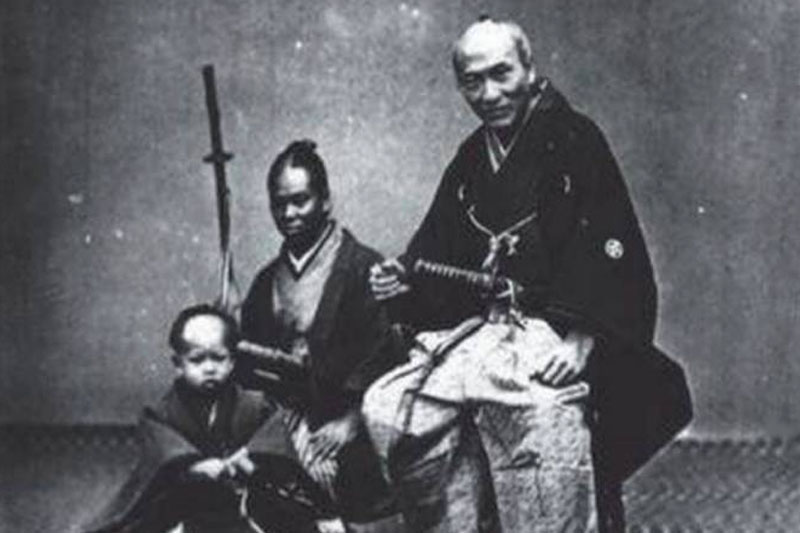Yasuke was a samurai of African origin who served the daimyo Oda Nobunaga during the last years of the Azuchi-Momoyama Period. In this article, we will talk a little about this samurai and his importance in the history of Japan.
Yasuke [弥助, 弥介, 彌助 ou 彌介] was an African samurai who served Oda Nobunaga between 1581 and 1582. He was considered the first foreigner to serve as a samurai in Japan. Check out below the story of this samurai:
Table of Content
Origin, Yasuke's real name and arrival in Japan

According to historical tales, Yasuke was from Mozambique. However, these tales were written years after his death. Also, there is no other source to corroborate this theory. Probably the theory is basically an assumption.
Your true name is also unknown. Legend has it that your name in Japan is based on the African name Yasufe or Issufo. However, there is nothing to corroborate this either.
Yasuke arrived in Japan in 1579. He was in the service of the Italian Jesuit Alessandro Valignano. Valignano had been appointed inspector of the Jesuit missions in the Indies (Eastern Africa, South and East Asia).
He accompanied Valignano when he arrived in the Japanese capital in March 1581 and his appearance caused much interest with the local population.
In the service of Oda Nobunaga

When Yasuke was introduced to Nobunaga, the daimyo suspected that his skin was colored with black ink. Nobunaga had him strip from the waist up and made him rub his skin.
When he realized that his skin was not colored and, in fact, black, Nobunaga took an interest in him. At some point, although it is unclear, the African entered Nobunaga's service.
It is likely that he spoke considerable Japanese. This was perhaps due to Valignano's efforts to ensure that his missionaries were better adapted to the local culture.
Yasuke was mentioned by Sonkeikaku Bunko (尊経閣文庫) in the archives of the Maeda Clan. According to Bunko, the African was given his own residence and a small ceremony by Nobunaga. Nobunaga also assigned him the duty of a weapon bearer.

After the Battle of Tenmokuzan, Nobunaga led his force, including Yasuke, and inspected the ancient territory of the Takeda clan. On the way back, the black man met Tokugawa Ieyasu.
In June 1582, Nobunaga was attacked and forced to commit seppuku at Honnō-ji, Kyoto by the army of Akechi Mitsuhide. Yasuke was there and fought against Akechi's forces.
Shortly after Nobunaga's death, the African went to join Nobunaga's heir, Oda Nobutada, who was trying to rally the Oda forces at Nijō Castle. He fought alongside Nobutada's forces, but was eventually captured.
When Akechi was presented, he said that the black man was a worthless animal, therefore he should not even be killed, but taken to the nanban-ji. After that, he disappeared from Japanese history.

other foreign samurai
Subsequently, after the death of Yasuke, other foreigners served as samurais in Japan. Below is the list of foreigners who served under daimyos:
- Wakita Naokata (born as Kim Yeo-cheol), a Korean samurai who served under the Maeda clan during the Tokugawa Shogunate;
- Akizuki Tanenobu (real name unknown), Korean samurai who served under the Chosokabe clan;
- Soga Seikan (real name unknown), Korean samurai who served under the Nakagawa clan;
- Rinoie Motohiro (real name unknown), Korean samurai who served under the Mōri clan;
- Yagyū Shume (real name unknown), Korean samurai who served under the Yagyū clan;
- Yayōsu (born as Jan Joosten), Dutch samurai who served under the Tokugawa clan during the Tokugawa shogunate;
- Hiramatsu Buhei (born as John Henry Schnell), German samurai who served under the Matsudaira clan during the final years of the Tokugawa Shogunate;
- Eugène Collache, French samurai who fought for the República de Ezo;
